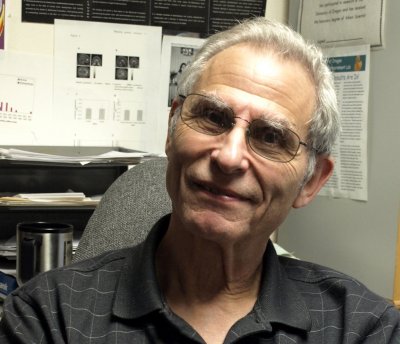 EUGENE, Ore. — (Jan. 19, 2012) —
EUGENE, Ore. — (Jan. 19, 2012) —
University of Oregon psychologist Michael Posner was named today by the National Academy of Science as the 2012 winner of the John J. Carty Award for the Advancement of Science. Sixteen other U.S. scientists also were recognized with awards for their efforts in a wide range of fields spanning the physical, biological and social sciences.
Posner, professor emeritus of psychology, was chosen for his "outstanding contributions to the understanding of spatial attention and development of attentional systems in children, and for his pioneering research with Marcus Raichle and Steve Petersen on the neural basis of cognition using non-invasive functional brain imaging methods," according the NAS announcement. The Carty Award comes with a medal and a prize of $25,000.
"The Carty award came as a complete and pleasant surprise to me," Posner said. "I believe it is the first time that cognitive science has been explicitly recognized for inclusion in this award. The interdisciplinary nature of the field is clear from my collaborators, who include Marc Raichle and Steve Petersen in neurology and radiology at Washington University in St. Louis, BJ Casey in psychiatry at Weill medical college, as well as Mary Rothbart and the late Steve Keele in psychology here at Oregon."
Keele died in 2005. An early leader in the study of psychological processes and neural mechanisms underlying attention and motor control, he had served as head of the UO's Department of Psychology from 1992 to 1995.
Posner, the 31st recipient of the Carty Award, is the first scientist to be singled out in the field of cognitive science. The American Telephone and Telegraph Co. established the award in 1932 to honor John Joseph Carty, an electrical engineer and a major contributor to the development of telephone wires and related technology.
"This award to Mike Posner is well deserved and reflects the transformative impact that his research efforts have had on advances that extend well beyond his own field," said Kimberly Andrews Espy, vice president for research and innovation and dean of the UO graduate school. "His work is a central pillar of the excellence in cognitive neuroscience research at the University of Oregon."
The NAS since took over the award process in 1961, narrowing its focus to specific fields. The 2012 award is for cognitive science. Posner and the other award winners will be honored April 29 during the 149th annual meeting of the NAS in Washington, D.C.
Posner, a co-founder of the Sackler Institute at Weill Cornell Medical College in New York City, joined the UO faculty in 1965. He was among a group of nine researchers given the 2008 National Medal of Science, the highest honor given by the U.S. government to scientists, engineers and inventors. Posner is considered a leading pioneer whose efforts have helped to build the field of cognitive neuroscience into what it is today.
Posner's work with Raichle and Peterson previously was recognized with the 2001 Grawemeyer Award for Psychology given by the University of Louisville. The three scientists began collaborating in the mid-1980s to advance the ability to isolate and measure the brain's mental functions. Their work, using positron emission tomography, led to non-invasive functional brain imaging methods that, in turn, have allowed for discoveries of neuro-anatomical networks that support language and attention processes.
Posner has won numerous honors, including the Dana Foundation Award in 1996 for pioneering work in medicine. He was named Scientist of the Year in 1995 by the Oregon Academy of Sciences, elected as a member of the Institute of Medicine of the National Academy of Science in 1988; as a fellow of the American Academy of Sciences in 1986, as a fellow to the National Academy of Science in 1981, and as a Guggenheim Fellow for 1979-80.
Born in Cincinnati, Ohio, he earned a bachelor's degree in physics and a master's degree in psychology in 1957 and 1959, respectively, from the University of Washington in Seattle and a doctorate in psychology in 1962 from the University of Michigan. He served as head of the UO psychology department from 1995-1998.
About the University of Oregon
The University of Oregon is among the 108 institutions chosen from 4,633 U.S. universities for top-tier designation of "Very High Research Activity" in the 2010 Carnegie Classification of Institutions of Higher Education. The UO also is one of two Pacific Northwest members of the Association of American Universities.
About the National Academy of Sciences
The National Academy of Sciences is a private, nonprofit institution that was established under a congressional charter signed by President Abraham Lincoln in 1863. It recognizes achievement in science by election to membership, and -- with the National Academy of Engineering, Institute of Medicine, and National Research Council -- provides science, technology and health policy advice to the federal government and other organizations.
Media Contacts: Jim Barlow, director of science and research communications, 541-346-3481, jebarlow@uoregon.edu, or the NAS Office of News and Public Information, 202-334-2138, news@nas.edu